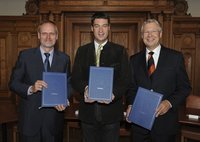Audi Uses More Waste Heat, Produces Less Co2
INGOLSTADT, GERMANY – September 29, 2009: The new waste heating contract has been signed, sealed and delivered. Member of the Audi Board for Production Frank Dreves, Ingolstadt Mayor Dr. Alfred Lehmann, Gerhard Fischer of the Petroplus refinery, Gerhard Meyer of Zweckverband Müllverwertungsanlage Ingolstadt (the Ingolstadt waste utilization plant), Raimund Wunder of Volkswagen Kraftwerk GmbH and Herbert Stockmeier of Stadtwerke Ingolstadt (the Ingolstadt municipal utility company), signed the pioneering document in the presence of Dr. Markus Söder, the Bavarian State Minister for the Environment and Health. Beginning in 2011, the Ingolstadt municipal utility company Stadtwerke Ingolstadt will increase the amount of waste heat supplied to Audi to roughly 120,000 MWh per year. The amount of waste heat supplied to the City of Ingolstadt will likewise increase to roughly 310,000 MWh per year under the terms of the contract. This corresponds to potential annual savings of roughly 67,000 metric tons of CO2, of which 26,000 metric tons are of at Audi alone.
The contract represents a first important step on the road to an Ingolstadt energy alliance for climate protection. Besides Audi, additional consumers in the city will also utilize the environment-friendly waste heat of Swiss-based Petroplus’s refinery in Ingolstadt and that of Zweckverband Müllverwertungsanlage, Ingolstadt’s waste utilization plant, in the future.
Member of the Audi Board for Production Frank Dreves says that this commitment is “an important component of our integral efficiency strategy and a fundamental step for sustainable operation.” According to Dreves: “The ecological advantage of using waste heat is obvious. It is therefore our common goal to increase the amount of waste heat from 120,000 MWh to 200,000 MWh per year in the future, thus saving up to 45,000 metric tons of CO2 at the Audi plant.” Also worthy of note is the fact that Audi has been able to keep its energy requirement essentially constant since 2003 – despite having increased automobile production by roughly 10 percent and using roughly 15 percent more space.
The Audi plant currently has an overall heat requirement of around 410,000 MWh per year. Under the terms of an existing contract, Stadtwerke Ingolstadt supplies 60,000 MWh of heat from the Zweckverband Müllverwertungsanlage, Ingolstadt’s waste utilization plant. An additional 100,000 MWh of heat are produced at Audi’s own power-heat-cooling trigeneration plant. The remainder of the heat requirement is met using natural gas-fired boilers. “The new waste heating contract will shift the emphasis away from gas in favor of waste heat utilization and heat from trigeneration,” says Dreves. Audi is investing around six million euros to enable it to use the waste heat.
Ingolstadt Mayor Dr. Alfred Lehmann praised the cooperation with the major consumer Audi, calling it a milestone in the reduction of natural gas consumption and carbon dioxide emissions. “This contract is an impressive example of the appropriate and creative use of resources. It also contributes to further enhancing the attractiveness of Ingolstadt as a business location.”
Refinery manager Gerhard Fischer: “We are taking a large step into the future and are making a valuable contribution for the protection of the climate in the region. This energy alliance enables the Petroplus refinery, which is already among the top-ten refineries in Europe with respect to low energy consumption, to further improve its standing.
Stadtwerke Ingolstadt, which currently supplies 412 customers with waste heat, will have an important role to play in this. The required expansion of its distribution network and facilities will cost the municipal utility approximately 23 million euros.
Hubert Stockmeier, General Manager of Stadtwerke Ingolstadt Netze GmbH, emphasized that regional companies will be given preference when contracts are awarded for this work. “We have strong ties to the city and its people. As a regional power utility, we not only consider ourselves to be responsible for the safe and ecological supply of energy, but we also have a responsibility for the economy.”
The grid operator plans to begin construction of a 5,300 meter-long waste heating line from Petroplus to the existing hot water network at the start of 2010. Petroplus will begin construction of the facilities required to extract the waste heat at that same time. During the inspection by the technical inspection authority TÜV in the first quarter of 2011, heat exchangers will be installed in the refinery’s process plants to make previously unused waste heat available to Stadtwerke Ingolstadt. Stadtwerke Ingolstadt will also modify its block heating plant and a pumping station in addition to installing a new standby boiler. At the same time, the waste utilization plant will increase its heat production by approximately 20 percent solely through process control optimizations. Commissioning of the expanded waste heating network is scheduled for April/May 2011.
The establishment of the Ingolstadt energy alliance was preceded by a study by the Bavarian State Office for the Environment in December 2006, which identified a number of opportunities for the efficient use of waste heat in Ingolstadt. “The new waste heating contract is a first step in this direction, with others to follow,” proclaims Stadtwerke General Manager Hubert Stockmeier.



